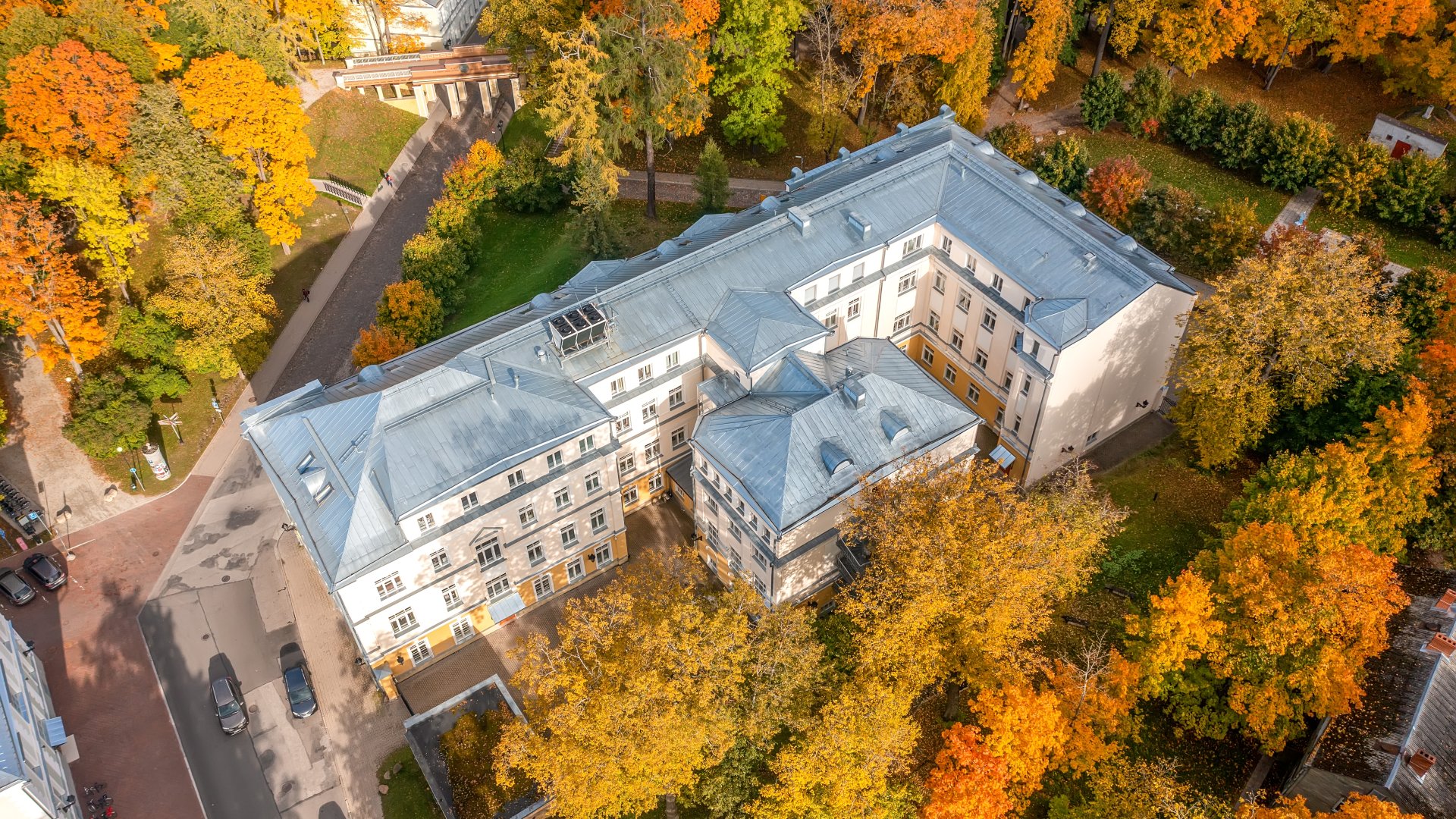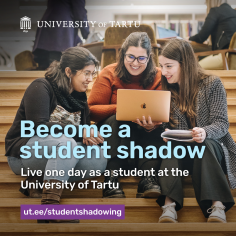Politics and Governance in the Digital Age
Master's
2 January
15 March
30 April
1 September
- The University of Tartu is ranked in the top 230 universities in the world in politics (see Rankings and Surveys).
- Estonia is one of the most dynamic reformers in Europe while maintaining a stable democracy and social environment. It is a world leader in e-government and e-voting.
- Join the Politics and Governance in the Digital Age MA programme to learn how democratic states and societies function and how they are shaped by the digital age, with a special emphasis on e-governance and digital democracy.
- Estonia is the ideal place to study to understand how a democratic society can be built and digitally transformed.
- Get in touch with Estonia’s e-governance community.
- Acquire the essential skills and knowledge for a successful career in modern government, civil society, politics, and international organisations.
Democratic governance is facing many challenges. Citizens demand high-quality public services and have high expectations about how governments should take their concerns and ideas into account in policy-making and public service delivery. At the same time, more and more interactions between governments and citizens take place digitally. In Estonia, Internet voting has become the most prevalent mode of casting a vote at local, national and European elections. Social media have become platforms through which political actors, including populist and extremist ones, reach out to voters and through which citizens’ political discontent is voiced and sometimes amplified. Furthermore, algorithms are increasingly being used to determine what services citizens are entitled to get, but also to identify which citizens are more likely to commit tax fraud or have difficulties finding employment. All these digital innovations provide promising perspectives but also raise fundamental political and ethical questions: what are the impacts of social media on voting behaviour, should Big Tech companies be regulated (and if so, how), and how ‘just’ and fair is algorithmic governance?
The master's degree programme in Politics and Governance in the Digital Age offers knowledge and skills that enable you to navigate this changing landscape of governance, politics and digital innovations. This programme integrates the fundamentals of governance, digital transformation and data analysis to improve our understanding of contemporary challenges to governance, politics and democracy. Understanding aspects of digital governance, as well as the basic structures of democratic states and societies, is key to a successful career in modern government, civil society, politics, public sector innovation or international organisations.
The master's programme provides in-depth knowledge about core political science topics, such as political ideas and institutions, elections, and political behaviour, along with a study of digital democratic innovations, electronic governance and digital society. This is reinforced by training in data analytics, research methods and techniques of quantitative and qualitative analysis.
Political science is among the highest-ranked specialities taught at the University of Tartu (see Rankings and Surveys).
A student who has completed the programme:
- has comprehensive knowledge of modern politics and public governance (including democratic theory and institutions, elections and party systems, policymaking and organisation of public services) and is able to use this knowledge to develop solutions for real-world problems;
- has acquired basic knowledge of the development and functioning of information societies and understands how the digital transformation affects public administration, politics and society;
- is familiar with the approaches and research methods used in political science and public administration and is able to independently formulate research questions, develop and test hypotheses, synthesize and analyse data, make inferences and draw valid conclusions, and be able to assess the academic and societal impact of research, including ethical implications;
- has acquired the necessary skills and digital competences to understand and analyse opportunities and threats associated with digital innovations at various levels of governance, including local, national, European and international;
- is prepared to work as a specialist in the field of research, government, non-governmental organisations, public sector consultancy, or international organizations, by demonstrating initiative, creativity, responsibility, leadership, management and teamwork skills;
- is able to identify his/her needs for continuing education and professional development and masters effective methods for independent learning.
Why study Politics and Governance in the Digital Age at the University of Tartu?
- to gain a comprehensive understanding of the functioning of modern democratic politics, public administration, and societies in the digital age;
- to enhance research skills, including in research design and qualitative and quantitative methods, and learn to use these to conduct policy impact assessment;
- to gain insight into the effects that digital transformation has on politics and modern governance, drawing, in particular, on the experience of Estonia – arguably one of the most advanced digital societies in the world;
- to experience first-hand how e-democracy and e-governance can affect different aspects of life, as the City of Tartu and the country of Estonia are at the forefront of digital democracy.
The University of Tartu is an excellent place where to learn about politics and governance in the digital age because Estonia is one of the global leaders in e-government, internet-based voting and other governance fields. For years, Estonia has been ranked as one of the most dynamic reformers in Europe, while at the same time maintaining a stable democracy and social environment. Read more about the e-Society of Estonia.
The master's degree programme in Politics and Governance in the Digital Age is based on learning from this success story against the backdrop of global theories and trends in politics. We believe that Estonia is the place to study how digital governance can be implemented in today’s world of globalisation and digital transformation.
In academic scoreboards, the University of Tartu ranks among the top 350 of universities in the world.
The University of Tartu offers advanced study facilities, excellent libraries, well-equipped computer labs and modern residence halls. Interactive and innovative teaching and learning methods are widely used. There is a wide variety of opportunities to study abroad, including Erasmus agreements with a broad range of European partner universities.
Studying in Tartu is both attractive and relatively affordable – it means high-quality education at a reasonable cost in a country that both has traditions and is very modern, is close to nature as well as technologically advanced, is proud of its unique culture and traditions as well as open to the world (Estonia is a member of the EU and NATO and it belongs to the eurozone and the Schengen space).
Programme highlights in video
- Watch the programme director talk about the master's programme in Politics and Governance in the Digital Age during Virtual Open Day 2024.
- Watch the presentation about International master's admissions by the Head of International Admissions during Virtual Open Day 2024.
Course and module details
This programme structure is the latest one confirmed by the university. Next year's modules will be updated by 15 April. Significant changes to the programme will be announced in advance on this website. Check the Study Information System for the latest updates.
Curriculum version:
More info: Study Information System
Johan Skytte Institute of Political Studies
The Johan Skytte Institute of Political Studies is a part of the Faculty of Social Sciences at the University of Tartu. The institute's BA, MA, and PhD programmes have been created in order to develop students' academic competence and personal growth. To achieve this, the institute's international team is focused on knowledge-based research, quality education, and active learning. To achieve a better and deeper understanding of society, the Skytte Institute hosts the Center for EU–Russia Studies, the Centre for Applied Social Sciences, and various additional research units.
Johan Skytte was the initiator of the idea of founding a university in Tartu, and the first chancellor of the University of Tartu. In his inaugural address, he said that besides noblemen and burgesses the peasants, too, should have the right to study at the university.
Read more about the Johan Skytte Institute of Political Studies here.
People
The MA programme in Politics and Governance in the Digital Age is taught by a young and diverse faculty trained at some of the world’s best universities (Columbia, Cambridge, European University Institute, University of Arizona, Central European University). Our staff encompasses people from nearly a dozen nationalities, offering students a multi-faceted perspective on politics and change.
Research themes include:
- e-governance (Prof. Vincent Homburg)
- internet voting (Dr Mihkel Solvak)
- history of political thought and political theory (Dr Eva Piirimäe)
- party politics (Dr Martin Mölder)
- political behaviour (Dr. Liisa Talving)
- public governance (Dr Kristina Muhhina)

Visit us virtually
Explore Tartu, the Johan Skytte Institute of Political Studies, and the student dormitories through the university's virtual tour here.
The Politics and Governance in the Digital Age master's programme provides you with essential skills and knowledge both in comparative political science and governance. Combined with data-driven governance, e-democracy and critical thinking in the digital society, students can explain how digital transformation affects modern political processes and public administration. This opens up many possibilities for applying your skills and knowledge after graduation from this programme.
Political scientists study the structure and theory of government and seek practical and theoretical solutions to political problems. This MA programme prepares students for advisory positions, high-level positions in ministries and governments, or to be employed at the highest levels of administration. Similarly, it enables students to start a career in the private sector, e.g. in consulting, given the expertise in the digital transformation of the public sector.
Former students have been employed at international organisations such as the United Nations Development Programme, the European e-Government Programme in Luxembourg, the European Commission or an embassy in Washington D.C. as a technology attaché. Some have opted for academia and continued in doctoral studies. The master's programme in Politics and Governance in the Digital Age equips students to operate in vast arrays of professional fields.
Alumni insights

Ville Tapani Haapanen, an alumnus from Finland, graduated from the master's programme in Politics and Digital Administration in 2022. Ville is now a doctoral student and works as a junior research fellow in political science at the University of Tartu.
What's your favourite thing about the University of Tartu?
In general, the variety of opportunities students have. Both everyday things like access to the university's gym for a very low price and things like Erasmus offers, different stipends and scholarships. Currently, I appreciate the level of flexibility that the University of Tarti affords its employees.
How would you characterise your programme at the University of Tartu in three words?
Intense, satisfying, and changing.
Did you conduct the internship during your studies?
No. I went for a semester abroad in Italy, and there was a small research assistant gig over one summer. I think both experiences positively affected getting into my current job, since I got some broader experience in political science and a little bit of hands-on experience doing research.
What was your social life like during your studies? What's the best tip for balancing social life and school?
Most of my MA studies happened during COVID-19. That put a damper on my social life. But as lockdowns allowed, the student union was actively organising different events, like the annual student days, and within the confines of the programme, there were informal events at least a couple of times a semester. People would also travel and do their things, of course.
In terms of balancing life and school, I tried to keep my studying to a schedule. Setting 'working hours' helped me stay sane, for sure. Otherwise, there would always be something more that could be done. Then, it's just a matter of prioritising.
Admission requirements for Politics and Governance in the Digital Age
- bachelor’s degree or equivalent qualification (must be obtained by the end of July) – please see our country-specific document requirements
- English language proficiency – please see our acceptable tests and exempt categories
NB! The restrictions for the citizens of the Russian Federation are specified here.
Applications are evaluated based on
- the score of the motivation letter (yields 50% of the final score)
- the score of the admission interview (yields 50% of the final score)
The motivation letter must be submitted with your online application by 15 March at the latest.
The motivation letter (in English, up to 5000 characters with spaces) should address the following points:
- Explain your motivation for applying to the programme (Why are you interested in politics and governance in the digital age? What are your plans for the future and how would this study programme help you achieve your goals?);
- Explain how your educational and professional background relates to the programme you are applying to (What makes you a good candidate for this programme? What have you accomplished in the past? What knowledge, skills, and experiences do you have that are relevant to this programme?);
- Please tell us about your specific research interests within the field of politics and governance in the digital age (What subfields or issues are you most interested in? What problems or issues would you like to examine in more depth? What would be a possible topic for your MA thesis?).
Evaluation criteria:
Each letter will be evaluated based on the following criteria:
- Relevance of previous educational and professional experience for the programme (25%);
- Motivation and ambition (25%);
- Identification of specific research interests compatible with the substantive content of the programme, ability to formulate a research problem/topic (25%);
- Writing skills and command of the English language (25%).
The maximum score for the motivation letter is 100 points and minimum positive score 51 points. The applicant needs to receive at least 51 points for the motivation letter, in order to be invited to the interview.
Admission interviews take place on: 10-11 April 2025
The interview is a follow-up to the motivation letter. It will last about 10-15 minutes and will be held electronically. The invitation with the online link will be sent to the candidate a few days prior. In the interview, the candidate should be ready to discuss their motivation to take up studies in the Politics and Governance in the Digital Age MA programme. The candidate should be able to describe their interests in relation to the study programme and be ready to give a brief overview of their planned MA thesis. We will also inquire about the candidate's preparedness to adjust to (a new) academic and cultural environment.
The maximum score for the interview is 100 points. Each interview will be evaluated based on the following criteria:
- Motivation and ambition (30%);
- Identification of specific research interests compatible with the substantive content of the programme, ability to formulate a research problem/topic (50%);
- Oral skills and command of the English language (20%).
For each assignment, the maximum score is 100 points and minimum score 51 points to be considered for admission. The applicant needs to receive at least 51 points for the motivation letter, in order to qualify for the admission interview. After the interview, the final admission score is calculated. The total admission score will be the weighted sum of the score of the motivation letter and the interview. The maximum number of final points is 100. Only applications which receive 66 points and above as a combined score from both indicators will qualify for admission.
Further information on assessing candidates´ academic performance and calculating admissions´ score.
How to apply
The following information applies to international students and Estonian students who graduated abroad:
The application system opens on 2 January and closes on 15 March. The following documents must be submitted electronically via DreamApply by 15 March:
- online application
- motivation letter
- official certified copy of the bachelor's diploma or its equivalent and Diploma Supplement (transcript) in the original language (must include description of the grading scale).
NB! Applicants graduating in the upcoming spring/summer and having their diploma and final transcript issued later than the application deadline should electronically submit their most recent official transcript by the application deadline. The transcript should be supplemented by an official statement from the issuing institution indicating current enrollment and expected graduation date. Admitted candidates are required to post certified copies of their graduation documents as soon as these have been issued (must reach us no later than by the end of July). - official translation of the bachelor’s diploma and Diploma Supplement (transcript) into English, translation certified
- proof of English language proficiency
- copy of the passport page stating the applicant’s personal particulars
- confirmation/receipt of application fee payment (if applicable). All international applicants are required to pay the application fee EUR 100, unless they have completed the previous study level in Estonia. An application will only be processed after the fee has been received by the UT.
Submitted applications can not be edited. It is only possible to upload new documents (e.g. graduation certificates). Applicants will receive feedback and notifications through the DreamApply system to their e-mail. Incomplete applications or those submitted by e-mail will not be considered for admission.
Guide to submitting an electronic application on DreamApply.
NB: The University of Tartu has no official partnerships with agents or educational representatives. We strongly recommend applying directly to the university without the help of unauthorised third-party entities. Should you use such a service, please ensure that your application's contact information is your personal details (your e-mail, phone number, etc.).
The evaluation of applications will be made based on the electronic copies added to DreamApply. A general ranking list will be formed based on the electronically submitted applications and admission results (including offers) will be announced to all applicants personally via DreamApply by April 30 at the latest. Admitted candidates are expected to accept or decline the offer in DreamApply in 7 days. If the decision is not communicated to UT via DreamApply by the stipulated deadline, UT reserves the right to withdraw the admission offer.
NB! It is not possible to postpone the beginning of studies to the next academic year.
Terms and conditions of the admission offer
Admission offers are conditional. This means that there are conditions in the offer which the applicant needs to fulfil in order to be admitted (e.g. sending application documents by post; obtaining the required level of education). If the conditions are not met, UT has the right to withdraw the offer. Also, UT reserves the right to withdraw or amend any offer or revoke the matriculation of a student, if it becomes evident that the application contains fraudulent information, the qualification does not provide access to the chosen study programme or the student is found to have omitted key information from the application. Should such circumstances occur, UT will not be liable for any material or immaterial loss which the student may suffer as a result.
Once the admission results have been announced, all admitted students are required to send the application documents by post to: Student Admissions, University of Tartu, Ülikooli 18-133, Tartu 50090, ESTONIA.
The documents are expected to be mailed only by those receiving the admission offer (unless instructed otherwise by the admissions staff). The documents must reach the university within 3 weeks from the announcement of the offer. If the application documents do not reach us by the deadline, the university has the right to withdraw the admission offer. Applicants will be informed when their documents have arrived.
Requirements for educational documents
All copies of educational documents (diplomas and Diploma Supplements/transcripts) must be officially certified. By certified we mean that the copies should bear an original signature and seal of the authority certifying that these are true copies of the original document(s). The copies can be certified either 1) by an authorised official of the issuing institution, or 2) by a notary, or 3) with an Apostille attached. NB! Country-specific requirements may also specify the way documents from certain countries must be certified.
Please note that UT does not accept simple copies made on the basis of already certified copies (primary copies are needed).
All admitted students are required to present their original qualification certificates upon arrival (unless these were sent directly from the issuing institution).
Paying the tuition fee (applicable to those receiving a fee-based study place offer)
- EU/EEA/Swiss citizens are required to pay the fee for the first semester once they arrive in Tartu (by 20 September at the latest after signing the fee contract, please read more here).
- Admitted students from other countries are required to pre-pay half of the first semester's tuition fee. The invoice along with the pre-payment deadline and payment details will be sent to applicants via DreamApply after they have accepted the admissions offer and the University has received the hard copies of the application documents. Second part of the fee is due on 20 September. NB! The official admission letter (necessary for visa application) will only be issued once the University of Tartu has received the pre-payment.
- NB! Once you have been offered a fee-based study place, be aware that it will not be changed into a fee waiver study place. By transferring the pre-payment to the university, you confirm that you have informed yourself about the process of the visa and temporary residence permit application and you are able to arrive in Estonia by the start of the academic year. If you have any questions please contact studentvisasupport@ut.ee.
The official admission letter will be sent to admitted students electronically via DreamApply only after the admissions office has received and reviewed hard copies of the application documents, and received the tuition fee pre-payment (if a pre-payment was required, please see step 3 for more details).
NB! The electronic admission letter is also sufficient for non-EU students for applying for visa/residence permit at an Estonian embassy.
Once the admission letter is issued, accepted students may proceed further with arranging their arrival. All non-EU students should first consult information on the process of visa and temporary residence permit application to be sure, as where and when the relevant documents need to be applied. Note that housing at the UT dormitories can be applied during a limited period of time, unless specified otherwise on the website.
NB! Admitted students who are not citizens of an EU or EEA country or Switzerland need to make sure they obtain the Estonian long-term visa on time in order to be able to participate in the orientation programme for international students held in the last week of August. They are also required to visit the Admissions Office in person to complete their arrival registration by September 1, 2025, at the latest. Failure to do so will result in the revocation of their admission decision and visa.
For housing alternatives please find further information on Tartu Welcome Centre website. Travel information can be found here. Based upon common queries, the most important information has been summarised into a pre-arrival information website UT Getting Started.
Estonian applicants should apply via National Admission Information Systems (SAIS). Further information in Estonian is available here.

07.02.2025





